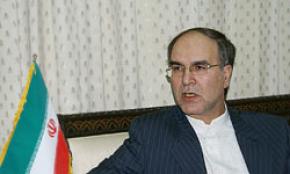ID :
196832
Sun, 07/24/2011 - 11:01
Auther :
Shortlink :
https://www.oananews.org//node/196832
The shortlink copeid
Envoy Stresses Positive Outcomes of Pakistani President's Visit to Tehran

TEHRAN (FNA)- Iranian Ambassador to Islamabad Mashallah Shakeri described the recent visit by Pakistani President Asif Ali Zardari as a "fruitful" event in the two neighboring countries' bilateral ties.
President Zardari paid a day-long visit to Tehran on July 16, his second to the Islamic Republic this month.
Pakistani analysts attached importance to the visit to promote regional approach to resolve issues instead of depending on other countries.
The Iranian ambassador who was satisfied with the visit of President Zardari to Tehran said, "Although it was a brief visit, but was very productive and result oriented."
Talking to the media at the national day reception of Egyptian embassy Friday night, he said that the main focus of the visit was to discuss bilateral relations but they also discussed the affairs of Muslim Ummah.
He said besides the Iran-Pakistan gas pipeline, other aspects to bilateral trade were also discussed in this important visit.
Iran and Pakistan have expanded their energy cooperation in recent years with Iranian Minister of Energy Majid Namjou saying in June that Iran plans to increase supply of electricity to Pakistan.
"Due to Pakistan's dire need to electricity, Iran can supply part of its power surplus to Pakistan," Namjou stated, adding that Iran has 10,000MW electricity surplus during season.
In 2008, Iran agreed to export 1,100 megawatt of electricity to Pakistan to help it overcome shortages in areas bordering Iran, especially in Gwadar.
Tehran has suggested establishment of joint venture companies in water and electricity sectors between Iran and Pakistan, and expressed its desire to have a sizable investment in hydroelectric plants in Pakistan.
Iran has 137.6 billion barrels of proven oil reserves and 29.61 trillion cubic meters of proven gas reserves, ranking third in the world in oil reserves and second in gas reserves.
The South Pars gas field is shared by Iran and Qatar. The Iranian share, which is divided into 24 phases, has about 14 trillion cubic meters of gas, or about eight percent of the total world reserves, and more than 18 billion barrels of liquefied natural gas resources.
President Zardari paid a day-long visit to Tehran on July 16, his second to the Islamic Republic this month.
Pakistani analysts attached importance to the visit to promote regional approach to resolve issues instead of depending on other countries.
The Iranian ambassador who was satisfied with the visit of President Zardari to Tehran said, "Although it was a brief visit, but was very productive and result oriented."
Talking to the media at the national day reception of Egyptian embassy Friday night, he said that the main focus of the visit was to discuss bilateral relations but they also discussed the affairs of Muslim Ummah.
He said besides the Iran-Pakistan gas pipeline, other aspects to bilateral trade were also discussed in this important visit.
Iran and Pakistan have expanded their energy cooperation in recent years with Iranian Minister of Energy Majid Namjou saying in June that Iran plans to increase supply of electricity to Pakistan.
"Due to Pakistan's dire need to electricity, Iran can supply part of its power surplus to Pakistan," Namjou stated, adding that Iran has 10,000MW electricity surplus during season.
In 2008, Iran agreed to export 1,100 megawatt of electricity to Pakistan to help it overcome shortages in areas bordering Iran, especially in Gwadar.
Tehran has suggested establishment of joint venture companies in water and electricity sectors between Iran and Pakistan, and expressed its desire to have a sizable investment in hydroelectric plants in Pakistan.
Iran has 137.6 billion barrels of proven oil reserves and 29.61 trillion cubic meters of proven gas reserves, ranking third in the world in oil reserves and second in gas reserves.
The South Pars gas field is shared by Iran and Qatar. The Iranian share, which is divided into 24 phases, has about 14 trillion cubic meters of gas, or about eight percent of the total world reserves, and more than 18 billion barrels of liquefied natural gas resources.





